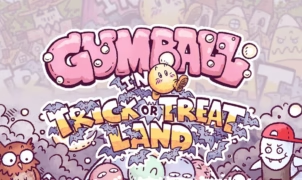You always remember your first.
Your first game that is. Whether it's the memory of an Atari 2600 title enjoyed on a friend's living room floor or a classic coin-op played at the arcade, most gamers born before 1980 nostalgically recall the title that first sucked them into the then-emerging world of interactive gaming. For many of us "old timers", it was the point-and-click adventure game that first facilitated our slide into video game addiction.
The original graphic adventures used puzzle-solving, exploration, dialog and scripted animations to advance a complex narrative. Born from the text-based adventures of the 1970's and evolving into the 2D and 3D graphic games in the 1980's and 90's, adventure games encompassed a wide range of genres that appealed to kids and adults alike.
During the Golden Age of adventure games-the late 1980's through the early 1990's-it seemed the sky was the limit as companies like Sierra Online and LucasArts pioneered new adventure game technology in the service of creating some of the most influential and beloved titles in gaming history. Then almost as soon as it began, the Golden Age was over. The unexpected resurrection of the home gaming console more or less spelled the demise of the PC adventure game.
Since then the game industry has broadened and become in some ways extremely varied and sophisticated, while in others it appears to have narrowed in scope. What aspects of the old school adventure titles – exploration, situational puzzles and dialog trees – that still exist today act mainly as supportive features of more action-oriented genres.
So with warring consoles dominating the video game landscape and PC games in general relegated to a small niche in that multi-billion dollar expanse, is there room anymore for the PC adventure game? Not many American companies are making them anymore but thankfully, European developers haven't given up.
Funcom, Pendulo and the Adventure Company have offered great titles in the classic adventure vein in recent years like Syberia I and II, Runaway and The Longest Journey: Dreamfall. These games offer great art direction, compelling story lines, memorable characters, and engaging gameplay, but sadly, only a fraction of today's gaming public have played or even know about these titles.
In light of the state of the PC game market, is it a pipe dream to hope for a resurgence of the classic adventure game? The people at Telltale Games based in San Rafael, CA hold adventure games near and dear as evidenced by their latest project, Sam and Max Episode I: Culture Shock, a sequel to 1993's acclaimed title Sam and Max Hit the Road. I asked Telltale designers Dave Grossman and Brendan Ferguson what they thought and their take on the state of the genre was happily optimistic.
Why do you think adventure games have been driven to near extinction in the mass market by more action-oriented titles in recent years?
Brendan: I think there are a few reasons action games have tended to be more successful in recent years. Many adventure games give you activities that are not inherently very entertaining. Fetch me a something-or-other, flip these levers, and so on. These seem more like chores than something I would pay money to do.
Action games tend to have much better pacing, giving the player a constant stream of challenges and rewards. In a well-designed action game, I can continually improve my skill without ever hitting a wall. Most adventure games, however, are designed such that you will almost certainly hit a point where you simply don't know how to proceed.
While these weaknesses in adventure games have long been present, they once drew large numbers of players simply because they were the only place one could get the experience of visiting another world and being involved in a story.
Dave: Quite a few reasons. For one thing, at the time when action games for PCs really took off (I tend to mark that in my head with the release of Doom in about 1993), the audience for games consisted primarily of teenage boys. It could be argued that the majority of boys that age are naturally more inclined to play tag than to stay in and read a book, and that's what your average action game provides – all the adrenaline of running around playing tag without any of the pesky, tiring exercise. Adventure games, conversely, make you think, and what teenager has time for that?
Related to the above – how viable in the current market are non-combat oriented, story-driven, puzzle/exploration games?
Brendan: Very viable! There's a huge range of interests out there, we just need to keep making quality games that give people a viable gaming alternative, and then find ways to get people to try it.
Dave: Entirely viable. For one thing, the audience is different than it used to be – it now includes lots of women, and the average gamer is about thirty. The emergence and success of "casual" games would seem to indicate that people would like to do more with their computers than just play tag.
How successful might an adventure game made on a console be?
Brendan: Adventure-type games have often been very successful on consoles, so I'd say a good adventure game could do quite well indeed.
Dave: Consoles are branching out now, and they've even got their own developing downloadable/casual games segment. There's potential for an adventure game to be very successful.
How could adventure games take into account market conditions and potentially bring in a new and broader audience, ie, women, non-gaming adults?
Brendan: That's just what Telltale's trying to do. We're working to create games that directly involve people in a wide range of enjoyable stories, without adding annoying or frustrating road blocks. Then we're just trying to make it as easy as possible for people to give those games a shot. We bet that if people just give it a try, they'll find a great new pastime!
What do you think the future of adventure games is?
Dave: Less geeky.
Brendan: I think the future of adventure games is very broad! There's plenty of room for different approaches, but naturally I think Telltale's approach of focusing on characters and story is a hugely important one. In time, I expect we'll see a greater variety of stories and worlds to explore, and I think Telltale's helping to make that happen.
———————————————————————————————————
The state of the game industry is constantly evolving. In recent years the thrust has been to pour millions of dollars into game development but many industry peeps and pundits predict the bursting of that bubble is imminent. Certainly, along with rising production costs comes the need for a larger gaming audience to cover these expenditures. That means drawing in people who have never even considered gaming as a form of entertainment and that means changing approach and thinking bigger than just serving the "male, age 18-34" market.
Many industry doom-sayers have claimed that the Apocalypse is nigh, that the game industry is going down in flames, but breaking out of the "geek" niche and going mainstream can only be a good thing for the health of the industry. Not only will it help publishers break out of the sequel/movie game rut they're in; for story-character-exploration enthusiasts it's the perfect climate for a broad range of new subject matter and gameplay to flourish, and perhaps sets the stage for a renaissance of the adventure game.
President & CEO














Leave a Reply